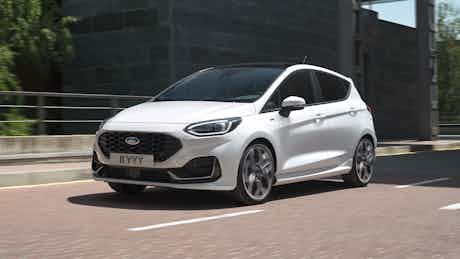Car changing is a big deal
Ford has confirmed it will discontinue the best-selling Fiesta next year along with the Galaxy and S-Max next year. In their place, Ford will reveal four new electric cars to go on sale in Europe by 2024.
The Ford Fiesta will be removed from dealerships in June 2023 after 46 years on sale, during which time more than 4.8 million Fiestas have found homes.
Ford has confirmed that production of the iconic supermini will end next summer. The Galaxy and S-Max people carriers will also be axed from April 2023.
Ford looks set to concentrate on EVs and SUVs, with models such as the electric Mustang Mach-E and Puma crossover becoming mainstays of the manufacturer’s range.
The brand will introduce three new electric cars and four electric commercial vehicles in Europe in 2024.
An official Ford video shared to mark the end of the Fiesta includes a single image of four car silhouettes (below).

The two cars on the left appear to be (from left to right) a Puma and a Mustang Mach-E, but the two cars on the right are more mysterious. Could these be the four new electric cars Ford plans to introduce in the next few years?
Why is the Ford Fiesta being removed from sale?

The Fiesta first appeared in 1976, and soon became a staple car for UK drivers. Over the years it has become something of a default choice for new drivers, being offered in three and five-door guises, as well as as a light van, and later in pseudo-SUV Active guise.
As recently as 2020, Ford trumpeted the fact the Fiesta had been the UK’s best-selling car for 11 years in a row. But with production due to end next summer, new examples of the model are likely to disappear from showrooms altogether by the end of 2023.
Small cars are notoriously difficult for manufacturers to turn a profit on, with development costs not much less for a small model than a heavier, more expensive one; marketing costs and tooling up factories for production also bring similar expenses, regardless of the size of a car.
Strict EU rules on vehicle emissions are also likely to have had an impact on Ford’s reported decision: while small, light cars like the Fiesta tend to produce less carbon dioxide than larger, heavier vehicles, car makers are allowed to offset recorded CO2 based on the average weight of the vehicles they sell, a legislative policy that does smaller, lighter vehicles no favours.
The global semiconductor chip shortage has also affected car makers’ strategy almost across the board: with vital computer chips harder to come by, manufacturers are prioritising production of vehicles with strong profit margins, rather than those with a less attractive business case.
